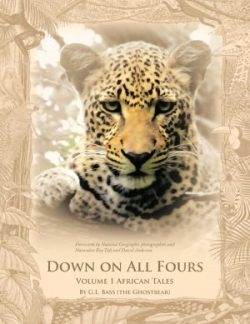Down on All Fours
Volume 1 African Tales
Blistering hot sun. Searing, dusty winds. Mysterious dense bush. Violence lurking around every bend in the path. G. L. Bass’ collection of poetry evokes an intense sensory impression of Africa, and muses on the ever-changing and never-changing relationships between humanity and the wild.
The author, a businessman and former teacher, has traveled around the Dark Continent five times—to Botswana, Kenya, the Serengeti. Bass is a close observer of nature and of human behavior, honoring and respecting all that he sees without fawning or making the embarrassing white man’s mistake of imagining that a Samburu warrior is “just like” a poet from Wisconsin.
In the lengthy piece “And Then They Die,” Bass learns from Bwana Michael, a young warrior in the honored position of sentinel at the white people’s lodge, who makes sure that the Samburu people are treated according to their laws. Michael explains how the Samburu know the ways of nature: “To walk with the Leopard / And he knows you in his heart, / Because you know his heart, / To look the lion eye to eye / (as he took his finger and put it close to my eye / Then took it back close to his eye) / He knows you have great courage, / Like him!”
Bass demonstrates similar affinity and awe for the wild creatures he watches. He calls the leopard “Prince of Darkness” and describes the cat’s process of preparing to hunt antelope. Bass projects a human mind onto the leopard’s hunting instinct and in doing so creates a poetic moment full of tension and import: “And there you are, / Watching, plotting, waiting, / Your mind focused, / Your imagination entranced / Into one vision. / You’re waiting for darkness / To settle down upon and over the African earth.”
The poet’s love for the harsh and beautiful landscape also comes through his words: “The sun sets / Across the woodlands, / Down through the bush, / It sheds itself out over the dried, / Winding river bed and finally settles down, / Into the canyon, / Filling it with an ancient / Liquid golden fading veil.”
Bass calls his work “the photo-poem: original poetry further enhanced with beautiful photographs.” The poems are laid out sparsely on the page, and each is followed by a snapshot or two. The images are not high-quality, however, and because they directly complement the content of the poems, the book would benefit from including more and better photos. Careful editing would also improve the text, as misspellings, unnecessary capitalization, and errors in homophones detract from the power of his work.
Bass’ anthropomorphizing feels genuine here, not cartoonish or sentimental. His collection’s title refers to the evolutionary event when humans stood up from all fours and connects readers to the moment when a photographer goes “down on all fours” to study an animal or line up a picture. It is there that Bass is made cognizant of the brotherhood he shares with the wilds of Africa.
Reviewed by
Karen McCarthy
Disclosure: This article is not an endorsement, but a review. The publisher of this book provided free copies of the book and paid a small fee to have their book reviewed by a professional reviewer. Foreword Reviews and Clarion Reviews make no guarantee that the publisher will receive a positive review. Foreword Magazine, Inc. is disclosing this in accordance with the Federal Trade Commission’s 16 CFR, Part 255.

